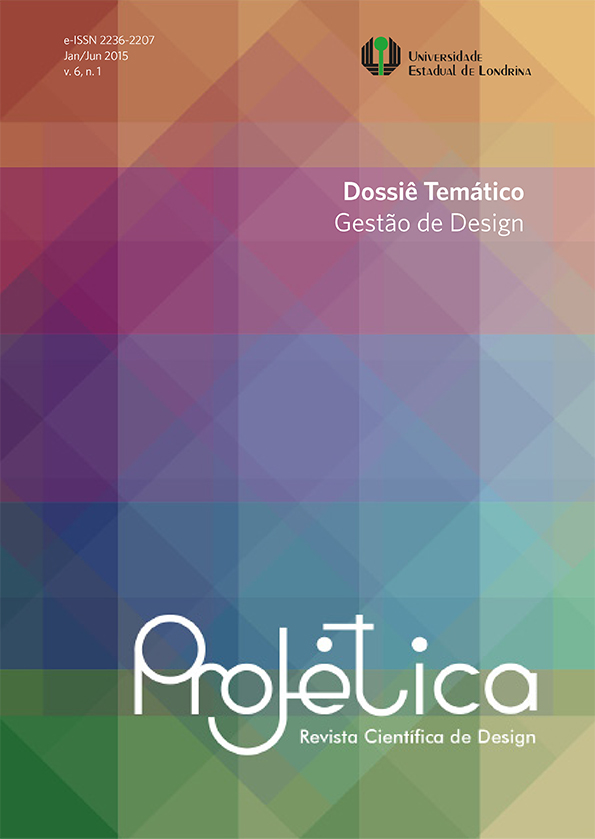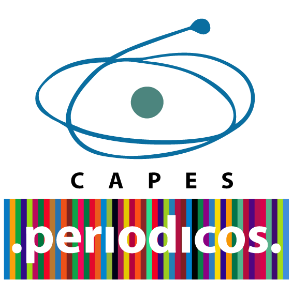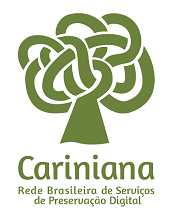O Design como a expressão de fazer as coisas juntos: um entendimento ecológico
DOI:
https://doi.org/10.5433/2236-2207.2015v6n1p77Palavras-chave:
Design, Ecologia, Cocriação, EducaçãoResumo
Este artigo propõe uma exposição conceitual do design a partir de uma cosmovisão essencialmente ecológica e que tem como ponto de partida o entendimento do viver e do fazer humano proposto por Humberto Maturana. Assim, pretende-se uma situação do design, em toda a sua diversidade, no fluxo dos acontecimentos globais para possibilitar o engendramento de novos significados em contrapartida ao paradigma antropocêntrico que legitima a degradação social e ecológica em curso.
Downloads
Referências
AHMED, D. N. Nasa-funded study: industrial civilisation headed for 'irreversible collapse'? Environment, London, 2014. Disponível em: http://www.theguardian.com/environment/earth-insight/2014/mar/14/nasa-civilisation-irreversiblecollapse-study-scientists. Acesso em: 10 Mar. 2012.
BATESON, G. Steps to an ecology of mind. Chicago: University of Chicago Press, 2000.
BOHM, D. Wholeness and the Implicate Order. London: Routledge & Kegan Paul, 1980
BUCHANAN, R. Wicked Problems in Design. In: MARGOLIN, V. & BUCHANAN, R. (eds.) The idea of Design: A Design Issues Reader. Cambridge: MIT Press, 1995.
CAMPBELL, C.; JOVCHELOVITCH, S. Health, community and development : towards a social psychology of participation. Journal of community and applied social psychology, v. 10. n. 4,.p. 255-270, 2000.
CAPRA, F. The Hidden Connections. London: Flamingo, Harper Collins, 2002.
CHESTNEY, N. 100 million to die by 2030 if world fails to act on climate. New York, 2012. Disponível em: http://www.reuters.com/article/2012/09/27/us-climateinaction-idUSBRE88Q0ZJ20120927. Acesso em: 10 Mar. 2014.
CODE, L. Ecological Thinking: the politics of epistemic location. Oxford: Oxford University Press, 2006.
EISENSTEIN, C. Sacred Economics: money, gift, and society in the age of transition. Berkley: Evolver Editions, 2011.
FERRY, L. The New Ecological Order. Chicago: The University of Chicago Press, 1995.
FERRY, L. A revolução do amor: Por uma espiritualidade laica. Rio de Janeiro: Objetiva, 2010.
FERRY, L. A Brief History of Thought. New York: Harper Collins Publishers, 2011.
FOSTER, J. B. The Vulnerable Planet: a short economic history of the environment. New York: Montley Revew Press, 2001.
GREER, J. M. Long Descent: a user's guide to the end of the industrial Age. Gabriola Island: New Society Publishers, 2008.
GREER, J. M. Ecotechnic Future: envisioning a post-peak world. Gabriola Island: New Society Publishers, 2009.
HEINBERG, R. The End of Growth: adapting to our new economic reality. Gabriola Island: New Society Publishers, 2011.
HICKEL, D. K. Co-design: setting relational domains for deep sustainability. Convergências - Revista de Investigação e Ensino das Artes (online), v. 12, 2013. Disponível em:http://convergencias.esart.ipcb.pt/artigo/165. Acesso em: 12 Dez. 2013.
HICKEL, D. K. Design as a Platform to Build Deep Sustainability: Reflections Around an Ideation Exercise with Portuguese Schools. International Journal of Designs for Learning, v. 5, n. 1, p. 1-11, 2014.
HOLLICK, M. The Science of Oneness: a worldview for the twenty-first century. Winchester, U.K.: Books, 2006.
HOLMGREN, D. Future Scenarios: how communities can adapt to peak oil and climate change. Totnes: Green Books, 2009.
HOPKINS, R. The Transition Handbook: from oil dependency to local resilience.Totnes: Green Books, 2008.
HOPKINS, R. Rob Hopkins' Letter to BBC Slams Climate Denier Nigel Lawson. Hampshire, 2014. Disponível em: http://www.permaculture.co.uk/news/1402144366/rob-hopkins-letter-bbc-slams-climate-denier-nigel-lawson. Acesso em: 10 Fev. 2014.
HULME, M. Why we disagree about climate change: understanding controversy, inaction and opportunity. Cambridge: Cambridge University Press, 2009.
ISEOF. The Oil Drum: discussions about energy and our future. Fort Collins, 2012. Disponível em: http://www.theoildrum.com/ . Acesso em: 10 Fev. 2014.
JACKSON, T. Prosperity without growth : economics for a finite planet. London; Sterling, VA: Earthscan, 2009.
JOVCHELOVITCH, S. Social representations in and of the public sphere: towards a theoretical articulation. Journal for the theory of social behaviour, London, v. 25, n. 1, 81 p., 1995.
JOVCHELOVITCH, S. Knowledge In Context: Representations, community and culture. London: Routledge Publications, 2007.
LATOUCHE, S. Pequeno tratado do decrescimento sereno. Lisboa: Edições 70, 2011.
MARGOLIN, V. Design, the Future and the Human Spirit. Design Issues, v. 23, n. 3, 2007.
MARKUSSEN, T. The Disruptive Aesthetics of Design Activism: Enacting Design Between Art and Politics. Design Issues, v. 29, n. 1, 2012. Disponível em: http://www.mitpressjournals.org/doi/pdf/10.1162/DESI_a_00195. Acesso em: 10 Fev. 2014.
MATURANA, H. Ontology of Observing - The Biological Foundations of Self Consciousness and the Physical Domain of Existence. Conference workbook: Texts in cybernetics. In: AMERICAN SOCIETY FOR CYBERNETICS CONFERENCE, Felton, 1988, CA, USA. Disponível em: http://ada.evergreen.edu/~arunc/texts/cybernetics/oo/oo3.pdf. Acesso em: 10 Fev. 2014.
MATURANA, H. Emoções e linguagem na educação e na política. Belo Horizonte: Ed. UFMG, 1999.
MATURANA, H. Autopoiesis, Structural Coupling And Cognition: A History Of This And Other Notions In The Biology Of Cognition. Cybernetics and Human Knowing, v. 9, n. 3, 34 p, 2002.
MATURANA, H.; DAVILA, X. Um Diálogo sobre infância, ética e amor. São Paulo: Instituto Alana, 2012 . Disponível em: http://www.youtube.com/watch?v=bhkrB8WntNA. Acesso em: 12 Jun. 2013.
MATURANA, H.; VARELA, F. J. A Árvore do Conhecimento: As Bases Biológicas da Compreensão Humana. 8. ed. São Paulo: Palas Athenas, 1984.
MATURANA, H.; VERDEN-ZOLLER, G. Biology of Love: G.: Peterander,F. (Hrsg.): Focus Heilpadagogik, Ernst Reinhardt, Munchen/Basel 1996. Disponível em: http://www.lifesnaturalsolutions.com.au/documents/biology-of-love.pdf. Acesso em: 12 Jun. 2014.
MATURANA, H. R.; REZEPKA, S. N. D. Human Awareness: Understanding The Biological Basis Of Knowledge And Love In Education. In: CONFERENCE OF THE INTERNATIONAL ASSOCIATION FOR COGNITIVE EDUCATION, 6., 1997, Stellenbosch.
MEADOWS, D. H. Thinking in Systems. London: Earthscan 2009.
MOTESHARREI, S.; RIVAS, J.; KALNAY, E. Human and nature dynamics (HANDY): modeling inequality and the use of resources in the collapse or sustainability of societies. College Park, 2014.
NAESS, A. Ecology of Wisdom: Writings by Arne Naess. Edited by Alan Drengson and Bill Devall. Berkley: Counterpoint Press, 2008.
ODAC. The Oil Depletion Analysis Centre (ODAC). London, 2011.
ORR, D. Prefácio. In: STERLING, S. Sustainable Education: Re-visioning Learning and Change. Totnes: Green Books, 2001.
ORR, D. The Nature of Design. New York: Oxford University Press, 2002.
ORR, D. Prefácio . In: STONE, M. K.; BARLOW, Z. (Ed.). Ecological Literacy: educating our children for a sustainable world. San Francisco: Sierra Club Books, 2005a.
ORR, D. Place and Pedagogy In: STONE, M. K. e BARLOW, Z. (Ed.). Ecological Literacy: educating our children for a sustainable world. San Francisco: Sierra Books, 2005b.
PREECE, G. S. Co-Designing in Love: Towards the Emergence and Conservation of Human Sustainable Communities. 2011. 424p.Thesis (Doctor of Phylosophy) - Centre for the Study of Natural Design - Duncan of Jordanstone College of Art and Design University of Dundee, Dundee.
SANDERS, E. Design Serving People. In: PROCEEDINGS CUMULUS CONFERENCE ON FUTURE DESIGN AND INNOVATION, 2005, Danmarks Designskole. Disponível em: http://www.cumulusassociation.org/images/stories/Working_papers/WP_Copenhagen_15_05.pdf. Acesso em: 12 set. 2014.
SANDERS, E. B.-N. Information, Inspiration and Co-creation. In: INTERNATIONAL CONFERENCE OF THE EUROPEAN ACADEMY OF DESIGN, 6., 2005. Bremen, Germany. Disponível em: http://www.maketools.com/articles-papers/InformationInspirationandCocreation_Sanders_05.pdf. Acesso em: 12 set. 2014
SANDERS, E. B.-N. Design Research in 2006. Design Research Quaterly, v.1, p. 1, Sept. 2006.
SANDERS, E. B.-N. Contextmapping / Exploring Co-creation on a Large Scale. Collegerama. Delft: Technical University of Delft, 2009. Disponível em: http://collegerama.tudelft.nl/mediasite/SilverlightPlayer/Default.aspx?peid=35a0ffdf188342f7a7b39c0e212d531d. Acesso em: 4 out. 2014.
SANDERS, E. B.-N.; BRANDT, E.; BINDER, T. A Framework for Organizing the Tools and Techniques of Participatory Design. In: PROCEEDINGS OF THE 11TH BIENNIAL PARTICIPATORY DESIGN CONFERENCE, 10., 2010, Sidney. New York, NY, ACM, 2010. Disponível em http://dl.acm.org/citation.cfm?id=1900476&dl=ACM&coll=DL&CFID=72850900&CFTOKEN=41918960.
SANDERS, E. B.-N.; CHAN, P. K. Emerging Trends in Design Research: Changes over time in the landscape of design research. Make Tools. Columbus, Ohio, USA: The Ohio State University, 2006.
SANDERS, E. B.-N.; STAPPERS, P. J. Co-creation and the new landscapes of design. CoDesign: International Journal of CoCreation in Design and the Arts, v.4, n.1, p. 5-18, 2008.
SANDERS, E. B. N.; WESTERLUND, B. Experiencing, Exploring and Experimenting in and with Co-design Spaces. In: NORDIC DESIGN RESEARCH CONFERENCE - MAKING DESIGN MATTER!, 4., 2011, Aalto University, Helsinki.
SANDERS, E. B. N.; WILLIAM, C. T. Harnessing People's Creativity: Ideation and Expression through Visual Communication. In: LANGFORD, J.; MCDONAGH, D. (Ed.). Focus Groups: Supporting Effective Product Development. New York: Taylor and Francis, 2003.
SANDERS, E. B. N. From User-Centered to Participatory Design Approaches. In: FRASCARA, J. (Ed.). Design and the Social Sciences. London: Taylor & Francis Books Limited, 2002.
SANDERS, L.; SIMONS, G. A social vision for value co-creation in design. Open Source Business Resource, 2009. Disponivel em: http://www.osbr.ca/ojs/index.php/osbr/article/view/1012/973. Acesso em: 10 Maio 2013.
SDSN. An Action Agenda for Sustainable Development: sustainable development solutions network (SDSN), a global initiative for the United nations. New York, 2013.
Downloads
Publicado
Como Citar
Edição
Seção
Licença
Copyright (c) 2015 Projetica

Este trabalho está licenciado sob uma licença Creative Commons Attribution 4.0 International License.
Projética está licenciada sob a Creative Commons Attribution CC-BY 4.0 International. Os autores detém os direitos autorais e concedem à revista o direito de exclusividade de primeira publicação.
Os autores dos trabalhos aprovados autorizam Projética a, após a publicação, ceder seu conteúdo para reprodução em indexadores de conteúdo, bibliotecas virtuais e similares.
Os autores assumem que os textos submetidos à publicação são de sua criação original, responsabilizando-se inteiramente por seu conteúdo em caso de eventual impugnação por parte de terceiros. As opiniões emitidas pelos autores dos artigos são de sua exclusiva responsabilidade.
A revista se reserva o direito de efetuar, nos originais, alterações de ordem normativa, ortográfica e gramatical, com vistas a manter o padrão culto da língua e a credibilidade do veículo. Respeitará, no entanto, o estilo de escrever dos autores. Alterações, correções ou sugestões de ordem conceitual serão encaminhadas aos autores, quando necessário. Nesses casos, os artigos, depois de adequados, deverão ser submetidos a nova apreciação. As provas finais não serão encaminhadas aos autores.












